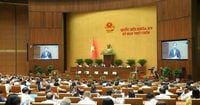In a significant move towards safeguarding individual privacy, the Vietnamese government is pushing forward with the draft Law on Personal Data Protection, which aims to establish a comprehensive legal framework to protect citizens' personal information. This initiative comes in response to growing concerns over data breaches and the unauthorized use of personal data, which have left many citizens feeling vulnerable in an increasingly digital world.
On May 5, 2025, Deputy Prime Minister Lê Thành Long presented the government's summary report on the draft law to the National Assembly. He emphasized that the law's creation is essential for institutionalizing the constitutional provisions regarding human rights, citizens' rights, and the inviolability of personal privacy. The draft law consists of 7 chapters and 68 articles, building upon the regulations outlined in Decree No. 13/2023/NĐ-CP.
According to Deputy Prime Minister Long, there are four primary justifications for the proposed legislation. First, existing legal regulations regarding personal data protection are inadequate and inconsistent. Currently, there are 69 legal documents related to personal data protection in Vietnam, but they lack uniformity in definitions and protective measures. Second, new challenges in data protection have emerged, necessitating a legal framework to address issues like excessive data collection and unauthorized data processing.
Third, the draft law aims to align Vietnam with international standards, as over 140 countries have already enacted laws on personal data protection. Finally, it seeks to create a legal basis for utilizing personal data to foster socio-economic development, recognizing that personal data is a vital resource in the digital economy.
Deputy Prime Minister Long stated, "The construction of the Law on Personal Data Protection aims to complete the legal system for personal data protection in our country, creating a legal corridor for personal data protection efforts and enhancing the capacity of individuals and organizations to protect personal data in line with international standards."
The draft law not only addresses the need for legal protection of personal data but also introduces new provisions to enhance accountability and transparency in data handling. It includes six prohibited acts, such as processing personal data against regulations, creating information to undermine the state, obstructing personal data protection efforts, and illegally collecting or transferring personal data.
Trung tướng Lê Tấn Tới, Chairman of the National Defense and Security Committee, expressed strong support for the law, highlighting its necessity in ensuring a legal basis for personal data protection and preventing violations. He noted that the law aligns with the government's digital transformation strategy and the development of a digital economy.
As the National Assembly prepares to discuss the draft law, public interest is palpable. Many citizens have voiced their concerns over the misuse of their personal data. Nguyễn Thị Hương from Hà Nội shared her frustration, stating, "I am frequently disturbed by unsolicited sales calls despite never having provided my phone number. I hope this law will clearly define who has the right to collect personal information and impose severe penalties for violations."
Similarly, Trần Văn Thắng from TP.HCM emphasized the need for the law to establish clear responsibilities for organizations that fail to protect data, insisting that mere warnings are insufficient. "There have been numerous data breaches, but no one seems to take responsibility. The new law must enforce strict accountability for organizations that leak data," he asserted.
Business owners are also expressing their anxieties regarding compliance with the proposed regulations. Anh Duy, a transport business owner in TP.HCM, acknowledged the challenges, stating, "In reality, businesses are struggling to comply with the law due to a lack of clarity regarding standards for handling personal data. A clear legal framework would make it easier for businesses to operate and foster fair competition."
Public sentiment indicates a strong desire for the law to provide tangible protections. Phạm Thị Mai expressed her unease, saying, "I don't understand why my ID number, date of birth, and address were exposed after applying for a loan through an app. I hope the law will specify who can retain my information and that I can request its deletion if I disagree with its use."
Hồ Đức Long from TP.HCM suggested that organizations should be mandated to transparently inform users about the data they collect and its intended use. He stated, "The law should require organizations to clearly communicate what data they are collecting and why. Users should have the option to consent or decline, rather than having their information automatically taken when using an application."
As the discussion around the draft law unfolds, many citizens are hopeful for a balance between individual privacy rights and legitimate data collection needs. Anh Thanh Khiết from Vĩnh Long expressed support for the law, emphasizing that it should provide clear guidance for business operations while respecting users' privacy.
Overall, the proposed Law on Personal Data Protection represents a crucial step towards establishing a robust legal framework for data privacy in Vietnam. The discussions in the National Assembly will be pivotal in shaping how personal data is managed and protected, ensuring that citizens' rights are upheld in an increasingly digital landscape.
As the nation prepares for the upcoming National Assembly session in May 2025, the hope is that this legislation will not only protect citizens from data breaches but also foster trust in the digital economy, paving the way for sustainable growth and innovation.

